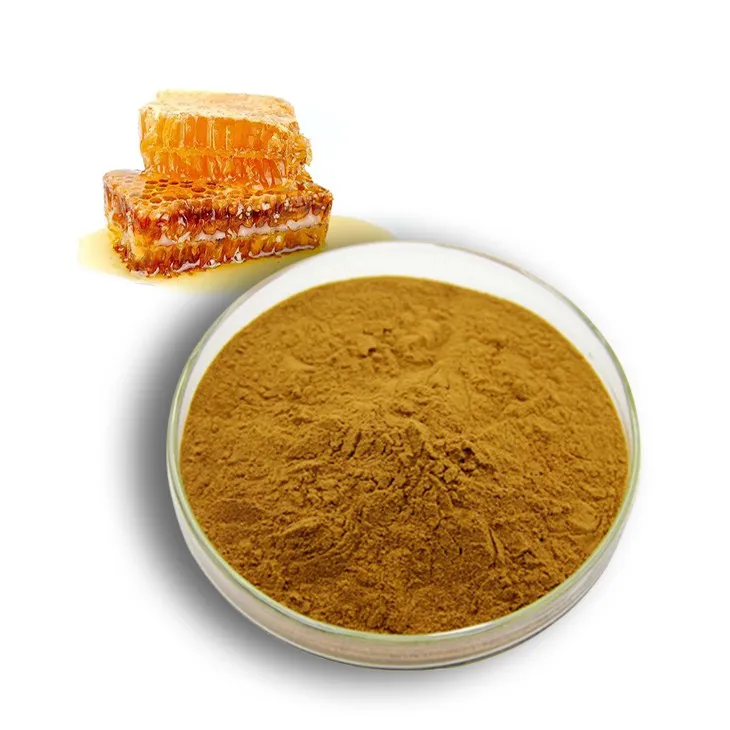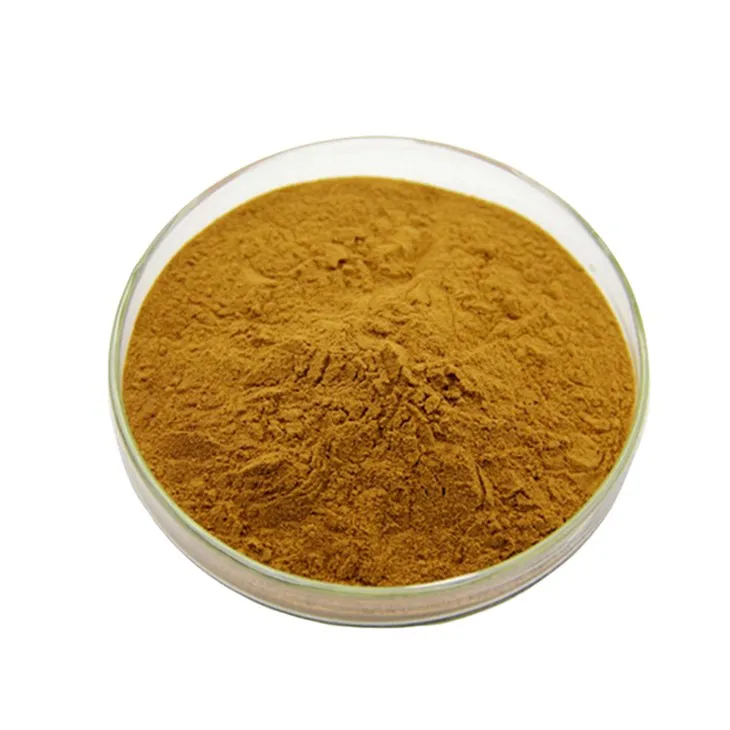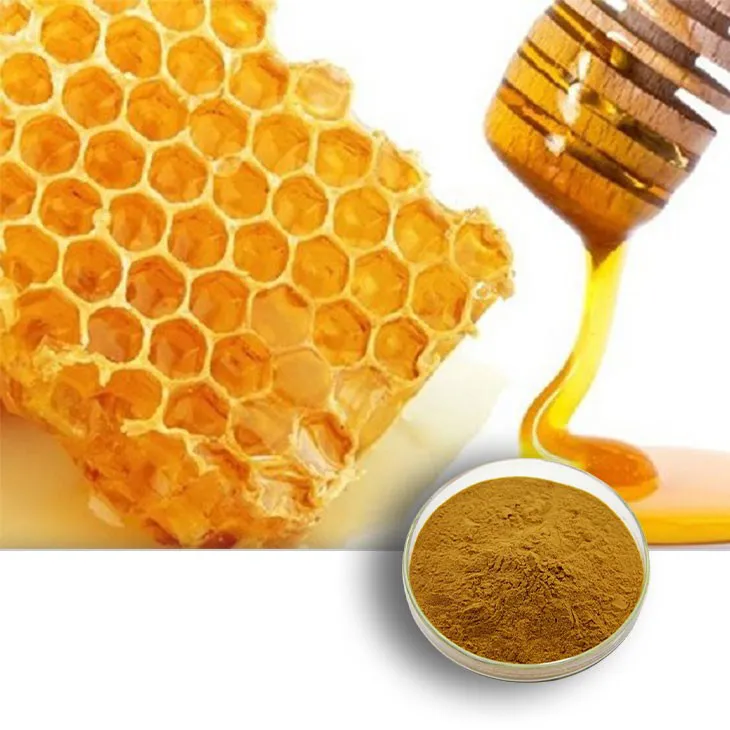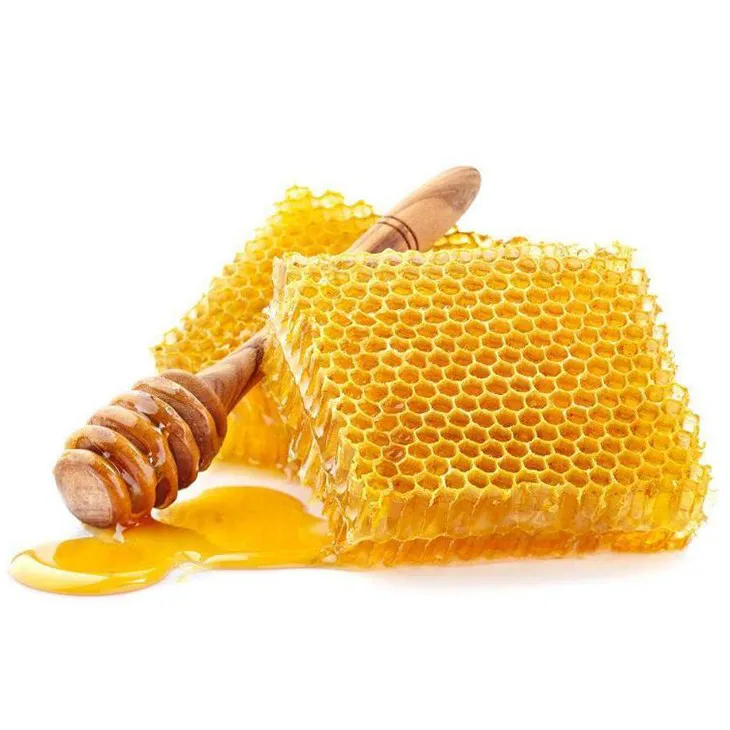- 0086-571-85302990
- sales@greenskybio.com
Propolis extract powder can reduce high blood pressure.
2024-11-12

1. Introduction
High blood pressure, also known as hypertension, is a prevalent health condition that affects a significant portion of the global population. It is a major risk factor for various cardiovascular diseases, including heart attacks, strokes, and heart failure. Conventional treatments often involve the use of medications, but there is an increasing interest in exploring natural alternatives or complementary therapies. Propolis Extract Powder has emerged as a potentially valuable option in the management of high blood pressure.

2. What is Propolis?
Propolis is a resinous substance that bees collect from tree buds, sap flows, and other botanical sources. Bees use propolis to seal small openings in their hives, protect against invaders such as bacteria and fungi, and maintain the overall integrity of the hive environment. Propolis Extract Powder is a concentrated form of propolis that has been processed for various applications, including potential health benefits.

3. Antioxidant Effects of Propolis Extract Powder
3.1. Free Radicals and Oxidative Stress in Hypertension
One of the key mechanisms underlying high blood pressure is the presence of oxidative stress. In the body, normal metabolic processes generate free radicals, which are highly reactive molecules. In a healthy state, the body has antioxidant defense systems to neutralize these free radicals. However, in hypertension, there is an imbalance between free radical production and antioxidant capacity. Excessive free radicals can damage cells, including those in the blood vessels, leading to endothelial dysfunction and increased blood pressure.
3.2. Propolis as an Antioxidant
Propolis extract powder contains a rich array of bioactive compounds, such as flavonoids, phenolic acids, and terpenoids, which possess strong antioxidant properties. These compounds can scavenge free radicals, reducing oxidative stress in the body. Flavonoids, in particular, are known for their ability to donate electrons to free radicals, thereby neutralizing them and preventing them from causing cellular damage. By reducing oxidative stress, propolis extract powder may help improve endothelial function in blood vessels, which is crucial for maintaining normal blood pressure.

4. Influence on Blood Vessel Function
4.1. Endothelial Dysfunction in Hypertension
The endothelium, the inner lining of blood vessels, plays a vital role in regulating blood pressure. In hypertension, endothelial dysfunction occurs, which is characterized by a reduced production of nitric oxide (NO). NO is a key signaling molecule that causes blood vessels to relax. When endothelial cells are damaged due to various factors, such as oxidative stress or inflammation, the production of NO is decreased, leading to vasoconstriction (narrowing of blood vessels) and an increase in blood pressure.
4.2. Propolis and Endothelial Function
Propolis extract powder has been shown to have a positive impact on endothelial function. It can stimulate the production of NO in endothelial cells. This is likely due to its antioxidant and anti - inflammatory properties. By increasing NO production, propolis helps to relax blood vessels, reducing peripheral resistance and ultimately lowering blood pressure. Additionally, propolis may also inhibit the production of endothelin - 1, a potent vasoconstrictor peptide. By modulating the balance between vasoconstrictors and vasodilators, propolis extract powder can contribute to the regulation of blood pressure.

5. Anti - Inflammatory Properties
5.1. Inflammation and Hypertension
Chronic inflammation is another important factor associated with high blood pressure. Inflammatory cytokines can activate various signaling pathways in the body, leading to endothelial dysfunction, increased vascular smooth muscle cell proliferation, and sodium retention. All of these processes can contribute to the development and maintenance of hypertension.
5.2. Propolis as an Anti - Inflammatory Agent
Propolis extract powder contains anti - inflammatory compounds that can suppress the production of inflammatory cytokines. For example, some of its flavonoid components have been shown to inhibit the activation of nuclear factor - kappa B (NF - κB), a key transcription factor involved in the regulation of inflammatory responses. By reducing inflammation, propolis can help to counteract the mechanisms that drive high blood pressure.
6. Effects on Renin - Angiotensin - Aldosterone System (RAAS)
6.1. The Role of RAAS in Hypertension
The renin - angiotensin - aldosterone system (RAAS) is a complex hormonal system that plays a crucial role in blood pressure regulation. Renin is an enzyme that is released by the kidneys in response to various stimuli, such as a decrease in blood pressure or a reduction in sodium levels. Renin cleaves angiotensinogen to form angiotensin I, which is then converted to angiotensin II by the angiotensin - converting enzyme (ACE). Angiotensin II is a potent vasoconstrictor and also stimulates the release of aldosterone from the adrenal glands. Aldosterone promotes sodium and water retention in the kidneys, leading to an increase in blood volume and blood pressure.
6.2. Propolis and RAAS Modulation
There is evidence to suggest that propolis extract powder may have an impact on the RAAS. Some studies have shown that propolis can inhibit the activity of ACE, thereby reducing the formation of angiotensin II. By interfering with this key step in the RAAS, propolis may help to lower blood pressure. Additionally, propolis may also have an effect on aldosterone levels, although further research is needed to fully understand this mechanism.
7. Clinical Studies on Propolis Extract Powder and High Blood Pressure
7.1. Overview of Clinical Trials
Several clinical studies have been conducted to investigate the effect of propolis extract powder on high blood pressure. These studies have used different dosages and formulations of propolis and have measured blood pressure parameters over a period of time.
7.2. Results and Limitations
In some of these studies, significant reductions in systolic and diastolic blood pressure have been observed in participants who took propolis extract powder compared to those in the control groups. However, it should be noted that the sample sizes in some of these studies were relatively small, and the duration of treatment varied. There is also a need for more long - term studies to determine the safety and efficacy of propolis extract powder in the management of high blood pressure.
8. How to Incorporate Propolis Extract Powder in the Diet
8.1. Dietary Sources
Propolis extract powder can be obtained from health food stores or online retailers. It is available in various forms, such as capsules, tablets, or powders. When choosing a propolis product, it is important to ensure its quality and purity. Look for products that are sourced from reliable beekeepers and have been tested for contaminants.
8.2. Recommended Dosage
The appropriate dosage of propolis extract powder for blood pressure management may vary depending on factors such as age, health status, and the severity of hypertension. However, in general, a daily dosage of 500 - 1000 mg has been suggested in some studies. It is always advisable to consult a healthcare provider before starting any new supplement, especially if you are taking medications for high blood pressure or other health conditions.
9. Safety Considerations
9.1. Allergic Reactions
Propolis is a natural product, but it can cause allergic reactions in some individuals. People who are allergic to bees, bee products, or have a history of allergies to pollen may be more susceptible to allergic reactions to propolis. Symptoms of an allergic reaction may include skin rashes, itching, swelling, and in severe cases, difficulty breathing. If you experience any of these symptoms after taking propolis extract powder, discontinue use immediately and seek medical attention.
9.2. Interaction with Medications
Since propolis extract powder may have an impact on blood pressure regulation, it is important to be aware of potential interactions with medications used to treat high blood pressure or other cardiovascular conditions. For example, if you are taking ACE inhibitors or other blood pressure - lowering medications, the combined use of propolis may potentiate the blood - lowering effect, which could lead to hypotension (low blood pressure). Therefore, it is crucial to inform your healthcare provider if you plan to use propolis extract powder while on medications.
10. Conclusion
Propolis extract powder shows great promise as an adjunct in the management of high blood pressure. Its antioxidant, anti - inflammatory, and effects on blood vessel function and the RAAS all contribute to its potential blood - pressure - lowering effects. However, more research is needed, especially large - scale, long - term clinical trials, to fully establish its safety and efficacy. For those interested in exploring natural options for blood pressure management, propolis extract powder may be a worthy consideration, but it should be used with caution and under the guidance of a healthcare provider.
FAQ:
1. How does propolis extract powder reduce high blood pressure?
Propolis extract powder may reduce high blood pressure through multiple mechanisms. Firstly, its antioxidant effects can help reduce oxidative stress in the body. Oxidative stress is often associated with endothelial dysfunction, which is a key factor in hypertension. By reducing oxidative stress, propolis extract powder can help improve the function of blood vessels. Secondly, it may also have an impact on the renin - angiotensin - aldosterone system (RAAS). This system plays a crucial role in regulating blood pressure. Propolis extract powder might interfere with this system to help lower blood pressure.
2. Is propolis extract powder safe for long - term use in reducing high blood pressure?
Generally, propolis extract powder is considered relatively safe for long - term use. However, individual responses may vary. Some people may be allergic to propolis, which could cause adverse reactions such as skin rashes, itching, or swelling. Before starting long - term use, it is advisable to consult a healthcare provider. They can assess your individual health status and determine whether propolis extract powder is a suitable option for you.
3. How much propolis extract powder should be taken to effectively reduce high blood pressure?
The appropriate dosage of propolis extract powder for reducing high blood pressure has not been standardized. It depends on various factors such as the individual's age, overall health condition, and the severity of hypertension. It is recommended to start with a small dose and gradually increase it under the guidance of a healthcare professional. They can monitor your blood pressure response and adjust the dosage accordingly.
4. Can propolis extract powder replace antihypertensive drugs?
At present, propolis extract powder cannot completely replace antihypertensive drugs. While it has shown potential in reducing high blood pressure, antihypertensive drugs are still the mainstay of hypertension treatment. Propolis extract powder can be considered as a complementary approach in combination with conventional treatment. However, any changes to the treatment regimen, especially reducing or discontinuing antihypertensive drugs, should only be done under the close supervision of a doctor.
5. Are there any side effects of using propolis extract powder for high blood pressure?
The most common side effects of using propolis extract powder are allergic reactions. As mentioned before, some individuals may experience skin rashes, itching, or swelling. In addition, in rare cases, it may cause gastrointestinal discomfort such as nausea or diarrhea. If any of these symptoms occur, it is important to stop using the product and seek medical advice.
Related literature
- The Effects of Propolis on Cardiovascular Health"
- "Propolis Extract: A Natural Remedy for Hypertension?"
- "Antihypertensive Mechanisms of Propolis in the Body"
- ▶ Hesperidin
- ▶ Citrus Bioflavonoids
- ▶ Plant Extract
- ▶ lycopene
- ▶ Diosmin
- ▶ Grape seed extract
- ▶ Sea buckthorn Juice Powder
- ▶ Fruit Juice Powder
- ▶ Hops Extract
- ▶ Artichoke Extract
- ▶ Mushroom extract
- ▶ Astaxanthin
- ▶ Green Tea Extract
- ▶ Curcumin
- ▶ Horse Chestnut Extract
- ▶ Other Product
- ▶ Boswellia Serrata Extract
- ▶ Resveratrol
- ▶ Marigold Extract
- ▶ Grape Leaf Extract
- ▶ New Product
- ▶ Aminolevulinic acid
- ▶ Cranberry Extract
- ▶ Red Yeast Rice
- ▶ Red Wine Extract
-
Green coffee bean Extract
2024-11-12
-
Alisma Extract
2024-11-12
-
Hericium erinaceus extract powder
2024-11-12
-
Hedyotis Diffusa Extract
2024-11-12
-
Epimedium extract powder
2024-11-12
-
Cactus Extract
2024-11-12
-
Chaste Berry Extract
2024-11-12
-
Citrus Aurantii Extract
2024-11-12
-
Uridine-5'-monophosphate Disodium salt
2024-11-12
-
Grape Leaf Extract
2024-11-12





















